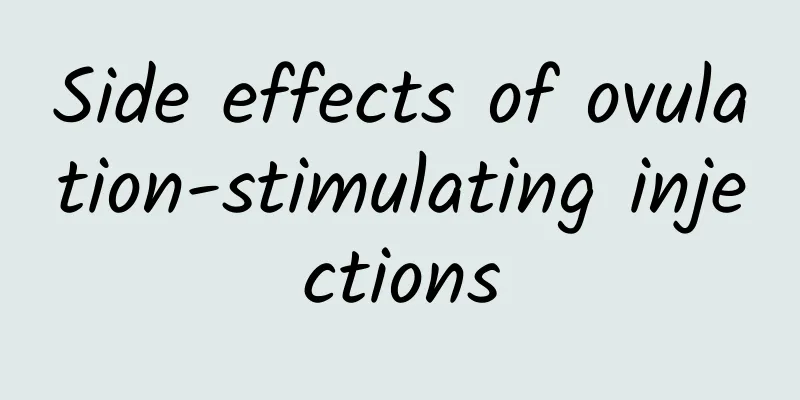Side effects of ovulation-stimulating injections

|
The ovulation-stimulating injection has the effect of promoting ovulation. For women undergoing in vitro fertilization, this is a necessary step in treatment. We know that normal women will ovulate every month. When taking the ovulation-stimulating injection, we must also understand some precautions to avoid some side effects. For example, it can easily cause abnormal vaginal bleeding and even have adverse effects on other organs and tissues. Side effects of ovulation-stimulating injections Ovulating on time every month is the first condition for pregnancy. Many infertile patients have to resort to ovulation-inducing drugs because they cannot ovulate. Professor Gu Chunxia from Beijing Wuzhou Women's Hospital introduced that ovulation drugs themselves are very good medicines that can help women who are unable to get pregnant due to irregular menstruation and inability to ovulate to become pregnant. However, regular hospitals have strict restrictions on the use of such drugs, and doctors without endocrine expertise must not use them indiscriminately. Because adult women generally ovulate one egg per month, artificially using ovulation-inducing drugs to induce the ovaries to ovulate more often will eventually result in ovarian hyperstimulation syndrome, such as dizziness, nausea, and damage to liver and kidney function. According to Professor Gu, because this type of drug may cause some complications, if a normal person takes ovulation-inducing drugs, ovulation will suddenly increase, and the normal body will find it difficult to withstand this change, which may lead to other complications such as ovarian cysts, ovarian rupture, embolism, electrolyte disorders, ovarian hyperstimulation syndrome, etc., which may cause consequences such as liver and kidney failure, pleural effusion and ascites to pregnant women, and even amputation and shock in severe cases. What are the contraindications of ovulation-stimulating injections? Unexplained abnormal vaginal bleeding during ovulation induction, uterine fibroids, ovarian cysts or enlargement, adrenal insufficiency, and thyroid insufficiency. It should be used with caution in the following conditions: asthma, heart disease, epilepsy, migraine, renal impairment, pituitary hypertrophy or tumors. It is contraindicated for patients with ovarian insufficiency, polycystic ovary, intracranial lesions, and hypothyroidism and adrenal cortex function. How long does it usually take for ovulation to occur after taking the ovulation-stimulating injection? I went to the hospital for an ultrasound yesterday and saw that the size of the follicle was 20*22*22. The doctor prescribed 6000 units of HCG for me to stimulate ovulation. Has any sister ever had ovulation-stimulating injections? How long does it usually take? Is it necessary to monitor ovulation again? A: I took the ovulation-stimulating injection last month, on the thirteenth day of my cycle. I finished the injection at noon that day, and I guess I had ovulation in the evening because my temperature went up the next day. It is best for girls to arrange AA immediately after the injection, and then make up for it the next day, so as not to miss the opportunity. |
<<: The correct method of removing acne with acne removal needles
>>: Throat blocked and gasping for breath
Recommend
What to do if your child has allergic urticaria
Allergic urticaria is a relatively common disease...
What to do if your child has herpes in the throat
Children have herpes in their throat, which is a ...
Acute dermatomyositis diet
Once contracted, acute dermatomyositis spreads ve...
Pain under left ribs when breathing
As we all know, the human body has 12 pairs of ri...
Does looking at your hands mean your baby is mentally retarded?
If a baby often looks at his hands, it is not a s...
A big face is not a disease, but thick legs can kill you, and a thick waist and back can ruin your life.
Waist: Charm lies in the waist. 1. The waist is t...
Yawning can bring you these unexpected surprises
Normally, we always say that "yawning is con...
Reasons for chest tightness and shortness of breath after meals
Chest tightness and shortness of breath after a m...
What causes cold joints? If your joints are cold, use moxibustion on the Mingmen acupoint
The joints of the human body are more susceptible...
How to make honeycomb wine
The method of making honeycomb wine requires taki...
How to quickly remove calluses on your hands
Calluses on the hands are quite common in daily l...
Best ointment for ringworm
Tinea manuum is a common disease in clinical prac...
The magical effect of thermosensitive moxibustion, what are the effects of thermosensitive moxibustion?
Thermosensitive moxibustion sticks contain variou...
Suitable temperature and humidity for human body
It is not that people are very comfortable stayin...
How to treat carotid artery sclerosis in traditional Chinese medicine
The general view of TCM in treating diseases is t...









